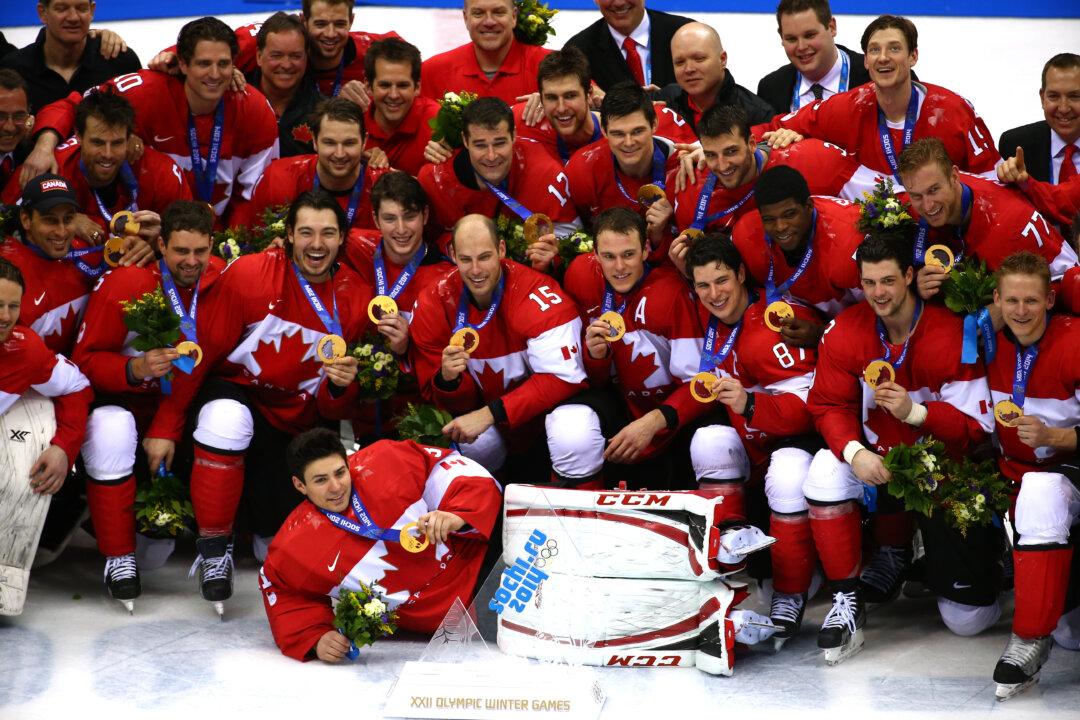Canada convincingly won their second straight Olympic gold medal in men’s ice hockey after beating Sweden 3–0 at the Bolshoy Ice Dome in Sochi, Russia on Sunday.
Here are three takeaways from Canada’s gold medal victory and tournament play:
1. Goaltending Problem Solved
Coming into the Sochi games, goaltending was Canada’s biggest question mark. It became clear that Montreal Canadiens goalie Carey Price would be the go-to guy, backed up by Vancouver 2010 gold medal winner Roberto Luongo.
Price had won gold as a junior, but this was his first chance on the Olympic stage—and he delivered, big time.
Sure, Price had an unbelievably solid six defensemen in front of him, but he made the saves when he had to and had a bit of luck on his side.
In the gold medal game, early in the first period, Sweden’s Gustav Nyquist skated in on Price and rung a shot of the inside of the post. The puck bounced under Price, but did not go in. Things could have been different for Canada had that puck that gone in.
Through six games, Canada gave up only three goals. Price came up with back-to-back shutouts in the semifinal and final.
In his only game, Luongo shut out the Austrians.
Price finished with a .971 save percentage—simply outstanding.
“Playing behind that group of guys was a lot of fun,” Price told CBC after the game. “This was a really cool life experience.”
2. Offense Is Best Form of Defense
It seemed like Canada was in complete control of the Olympics men’s hockey tournament. Maybe they didn’t score as many goals as Canadian fans would’ve liked, but their discipline and airtight defense allowed them to dominate their opposition.
Through relentless pressure, Canada neutralized their opposition and generated far more dangerous scoring threats than their opponents. Canada outshot every one of their six opponents and never trailed in the tournament.
The concern was that the Canadian forwards weren’t scoring as many goals as they should. The tournament began with only a 3–1 win over lowly Norway. But then, as head coach Mike Babcock told CBC prior to the gold medal game, “We’ve gotten better each and every day.”
It’s not about scoring many goals, but rather, about scoring goals when they needed to be scored.
Canada faced their toughest tests against Finland and Latvia, but came through with an overtime winner against the Finns and a late third-period winner against the Latvians.
While the stats for their big name scorers like Sidney Crosby aren’t anything to write home about, their defensemen contributed in spades.
Right-handed defenseman Drew Doughty led all Canadian scorers with four goals and two assists, followed by Shea Weber at three goals and three assists.
3. Leadership When It Matters
It’s been a bit of a bizarre tournament for Canada given that, coming into the tournament, their strength was supposed to be their forwards and defensemen.
But early tournament talk focused on Crosby’s lack of scoring, who should be his linemates, and if Chris Kunitz deserved to be on the team.
Nobody could question Crosby’s contribution on the ice in the gold medal game. Nor could they question former captain Jonathan Toews’ leadership.
And Kunitz answered his critics with a precise shot in the third period to put Canada up three goals.
Toews scored Canada’s first goal by going to the net and redirecting a pass from Jeff Carter. Toews also scored the first goal in Canada’s gold medal win four years ago in Vancouver at around the same time of the first period.
But then the backbreaker for Sweden was Crosby’s goal in a dominant second period for Canada. Capitalizing on a Swedish giveaway, Canada’s captain raced in on Henrik Lundqvist and beat him with a backhander.
Both Crosby and Toews centered lines that followed Babcock’s plan to the letter and they showed leadership at both ends of the ice. Both Crosby and Toews finished the six-game tournament with only a goal and two assists, but their contribution goes far beyond those stats.
It’s a gold medal repeat for Canada—the first during the era of NHLers playing in the Olympics. The gold medal game didn’t have the drama of 2010—the Sochi 2014 Olympics just showcased how perfectly a team can play the game.
Canada has certainly set the bar extremely high with this gold medal performance.
Follow Rahul on Twitter @RV_ETSports





